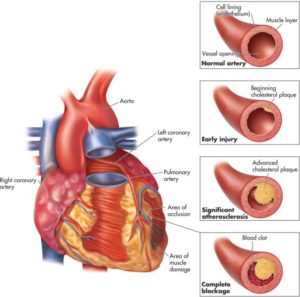What is Atherosclerotic Heart Disease?
Your body’s coronary arteries supply oxygen-rich blood to your heart. When the coronary arteries get narrow or hardened, it can cause atherosclerotic heart disease. Better known as coronary artery disease, this type of heart disease is caused by a condition called atherosclerosis. In this condition, the artery walls thicken due to the plaque buildup on the artery’s walls. The fatty material and other substances lead to the plaque buildup around the walls of the arteries, which causes them to get narrow and hard. As they get narrower, it becomes difficult for the coronary arteries to supply blood to the heart. This causes chest pain and other symptoms and ultimately leads to a heart attack.
Causes and Symptoms:
Common causes of atherosclerotic heart disease include: High blood pressure High LDL cholesterol level Diabetes or chronic kidney disease Alcohol consumption or smoking increases the risks of coronary artery disease The most common symptom of coronary artery disease is angina or chest pain. The patient feels the pain when the blood supply to the heart slows down. Other symptoms include fatigue due to slight exertion and shortness of breath. In women and elderly people, the symptoms of coronary artery disease are the same – patients suffer from weakness, fatigue and shortness of breath even after slight exertion. Women in their 40s are at a lesser risk of coronary artery disease than men. However, the risks increase when women get older and reach menopause.
Diagnosis:
There are several tests that diagnose coronary artery disease. Your heart specialist will recommend more than one test to come to a conclusion. Generally coronary angiography, electrocardiogram (ECG) and electron beam computed tomography (EBCT) comprise initial tests which diagnose coronary artery disease. EBCT tests are generally carried to determine whether there is a calcium buildup on the arteries. Chances of this type of heart disease are common if the test find more calcium buildup. Other key tests to diagnose include nuclear scan, exercise stress test and magnetic resonance angiography.
Treatment for Atherosclerotic Heart Disease:
Treatment for atherosclerotic heart disease depends on the severity of the disease and its symptoms. It is recommended to consult your doctor to know more about treatment options. Generally, the doctor or heart specialist recommends these medicines: Calcium channel blockers and ACE inhibitors to lower blood pressure and protect the heart. Aspirin to prevent any blood clotting on the arteries. Beta-blockers to lower the blood pressure and heart rate. Statins to lower cholesterol. There are a few good surgeries recommended by doctors to treat chronic artery disease. These include coronary artery bypass surgery, angioplasty and stent placement and minimally invasive heart surgery.
Prevention:
Here are a few good tips to prevent coronary artery disease: Avoid smoking and reduce stress. Eat foods low in cholesterol and fat. Follow a daily healthy exercise regime, at least 30-45 minutes a day. Obese patients should consider at least 90 minutes of exercise daily. Keeping a low blood pressure count can help patients prevent coronary artery disease. Always monitor your cholesterol and blood sugar levels and make sure you keep them under control. If you are diagnosed with atherosclerotic heart disease, consult your doctor regarding further tests, medications and surgeries. Better be safe than sorry.


